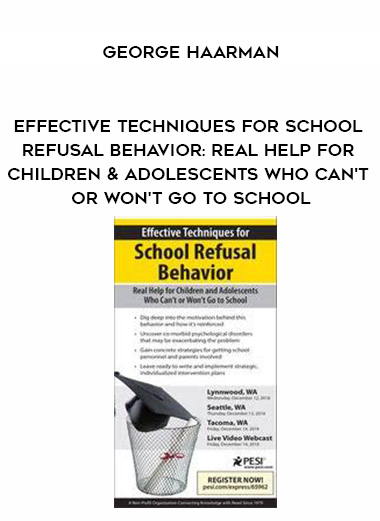Best Practices in Clinical Supervision: A Blueprint for Providing Effective and Ethical Clinical Supervision – George Haarman
Are you considering joining the ranks of those who are approved to provide this invaluable oversight of fellow professionals? Are you already a clinical supervisor and need to formalize and enhance your knowledge and skills? This recording presents a blueprint, based on established best practices, for providing effective and ethical clinical supervision.
Explore clinical supervision through the lens of critical legal, ethical, and risk management issues. Gain clarity on how to define the goals of supervision, as well as the responsibilities of both supervisor and supervisee. Analyze the “How Do I?” of clinical supervision, with details on individual vs. group supervision, case consultation, interactive live supervision, audio and video sessions, and other methods and techniques. Determine how to meet, and then exceed, your obligations regarding competence, confidentiality, vicarious liability, and other standards.
- Differentiate the roles and responsibilities of supervisor and supervisee
- Choose the most effective model of clinical supervision for a particular setting
- Determine how to properly use various methods and techniques of clinical supervision
- Explain how to avoid and resolve ethical, legal, and risk management problems that arise in clinical supervision
- Describe various tools available for evaluating supervisees and supervision
ESTABLISH ROLES AND RESPONSIBILITIES
- Administrative vs. clinical supervision
- Role of the clinical supervisor
- Teaching supervisees how to use supervision effectively
- Assisting supervisees in taking an active role
CHOOSE THE MOST EFFECTIVE SUPERVISION MODEL FOR YOUR SETTING
- Developmental models
- Psychotherapy based models
- Integrative models
- Parallel process model
- The supervisee as “patient”
MASTER EFFECTIVE METHODS AND TECHNIQUES OF SUPERVISION
- Multicultural supervision
- Individual vs. group supervision
- Co-therapy vs. co-responsibility
- Case consultation
- Written activities and case notes
- Live observation
- Interactive live supervision
- Audio and video recording of sessions
- Experiential methods
AVOID AND RESOLVE PROBLEMS THAT ARISE DURING SUPERVISION
- Ethical
- Supervisor competence
- Informed consent
- Boundary issues
- Dual relationships
- Supervisor/supervisee obligations
- Incompetent or impaired supervisees
- Sexual attraction
- Confidentiality
- Documentation
- Evaluation and feedback
- Legal
- Vicarious liability
- Standard-of-care
- Negligence
- Confidentiality vs. privilege
- Duty to warn/report
- Due process
- Risk management
- Knowledge of ethical codes and mental health law
- Supervision contracts
- Boundaries of competence
- Consultation supervision
- Documentation
- Ongoing training in supervision
- Liability insurance coverage
- Insuring confidentiality
- Supervisory malpractice
PROPERLY EVALUATE SUPERVISEES AND SUPERVISION
- Formative vs. summative evaluations
- Criteria for evaluation
- Standardization of methods
- Self-evaluation
- Objective evaluation tools
- Supervisory evaluation
- 360-degree feedback
- Develop a supervisory plan
CASE STUDIES
Salepage: https://catalog.pesi.com/item/best-practices-clinical-supervision-34299
Proof Content:
Delivery Method:
After your purchase, you’ll get access to the downloads page. Here, you can download all the files associated with your order.
Downloads are available once your payment is confirmed, we’ll also send you a download notification email separate from any transaction notification emails you receive from Coursedownloads.










